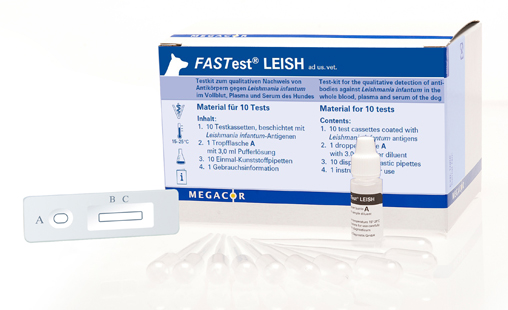
Lateral flow
Leishmaniosis
Product reference : 970010RK1
FASTest® LEISH is a rapid immunochromatographic test for the qualitative detection of antibodies against Leishmania infantum in whole blood, plasma or serum of the dog.
The visceral leishmaniosis of the dog is caused by the protozoon Leishmania infantum world-wide. Dogs and other canines are considered to be the reservoir for leishmaniosis in humans (zoonosis).
To date leishmaniosis was known in Leishmania free regions as a pure travel or import disease. New investigations show increased sporadic occurring autochthonous cases of leishmaniosis in so far Leishmania free regions. The vectors, sandflies (Phlebotominae), admittedly need a subtropical to tropical climate, which however is not geographically dependent on such climatic zones. There are first scientific verified discoveries of sandflies in temperate zones. Furthermore, an infection via mating (urine/sperm), via diaplacentar transmission and via blood transfusion are discussed.
Leishmania are transferred by sand-flies via stings. They infest and reproduce in macrophages and cells of the reticuloendothelial system (among others liver, spleen, bone marrow, lymph nodes). Dependent on the Leishmania zymodeme and the immune status of the dog, there are variable clinical symptoms with dermatological (different skin and claw alterations) and visceral (apathy, fever, nose bleeding, lameness, kidney failure) manifestations.
Due to the individual extremely variable incubation times, from a few months to several years, infested animals can be free of symptoms during that time. The detection of Leishmania antibodies can be pointing at an initiating or an existing infection. Thus, suspected animals and animals from endemic leishmaniosis regions (travel or import) should be tested serologically for antibodies repeatedly in an interval of 2–4 weeks. Animals from endemic areas and asymptomatic animals can show borderline to weak antibody titre (“seroprevalence”), whereas clinical diseased animals show a clear increase of titre between two tests (“disease prevalence”). Therefore, the indirect detection of antibodies with FASTest® LEISH gets a greater diagnostic importance.
Due to the innovation of a Leishmania vaccine, it is required to determine the antibody titre status of the dog before vaccination to get a decision “vaccination or no vaccination” adequate to the guidelines of the vaccine manufacturer.
For the detection of antibodies, a two-step diagnosis is known to be standard. The first step starts with an in-clinic IgG antibody screening test like FASTest® LEISH. Due to the fact that dogs from endemic areas show antibodies against Leishmania on principle, a positive FASTest® LEISH only means contact with Leishmania in the past, not always implying an active leishmaniosis. In a second step, a quantitative antibody titre determination should be done using indirect immunofluorescence test (MegaFLUO® LEISH) or ELISA (MegaELISA® LEISH canine) to determine the end titre.
FASTest® LEISH is based on highly specific recombinant peptides for the fast and reliable detection of antibodies against L. infantum in whole blood, plasma or serum of the dog.
- Test Principle : Lateral flow
- Packaging : 10
- Pathogenic : Leishmania infantum
